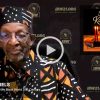Each August brings with it a commemoration of the 1965 Watts Revolt and thus rightful reflection on how it fits within our history as a people, how it spoke and speaks to vital issues of life and struggle, especially to the right and responsibility of resistance. Even the Watts Summer Festival finds its fundamental and ultimate meaning in its contribution to our cultural reaffirma- tion, historical memory and political consciousness and practice. For the Watts Re- volt fits firmly within our history and tradi- tion of righteous resistance to oppression, evil and injustice. Indeed, ours is a history and heritage of resistance expressed in struggles against our enslavement on the Continent, on the ships of horror and upon landing here in the racially savage wilder- ness of White dominated America.
But the commemoration of the Watts Revolt also brings to mind an even longer and larger history of resistance in African and human history. For the right and respon- sibility to resist oppression, evil and injus- tice are as ancient as humankind and are rooted in the ancient African ethical under- standing of what it means to be a self- determining moral agent in the world. This fundamental understanding of human beings is found in the sacred texts and ethical teachings of our ancestors in the Husia which obligates us “to bear witness to truth and set the scales of justice in their proper place, (especially) among those who have no voice.”
Moreover, the history of African resistance in this country is written in vibrant red, signifying relentless and resilient strug- gle; in bold Black, reflective of an audacious and undefeatable people; and in a hopeful green, pointing towards a future framed and forged in uncompromising and ongoing struggle. Thus, commemoration of any re- volt and resistance must always pay homage to all the martyrs and all the other men and women who sacrificed and gave themselves in countless ways to expand the realm of freedom, justice and other goods in this country and the world. Here, Harriet Tub- man and Nat Turner immediately come to mind, as do other openers of the way thru revolt and resistance in the Holocaust of en- slavement, such as Gabriel and Nana Prosser, Sojourner Truth, Frederick Douglass, and all the others too numerous to name, leading in a direct line of resistance to Watts and today.
From the Holocaust of enslavement and after emancipation with the rise of the anti-Black savage violence of segregation, we encounter vital models of resistance, calling us to continue the struggle and reaf- firm our right and responsibility to resist. David Walker, in his Appeal to our people during the Holocaust of enslavement, re- minds us, we “have a natural (God-given) right to freedom” that the enslaver has no right to enslave and oppress us, even as we make no claim and have no right to enslave and oppress him. And thus, he tells the en- slaving tyrants of America, we will and must resist in every way possible, for “we must and shall be free.”
And he challenges us to take rightful responsibility for our liberation and not en- trust it to enemies or allies, nor attempt to substitute deliverance prayer for liberating practice, but rather add work and struggle to professions of faith. For he says, we cannot “wait until God shall take us by the hair of our heads and drag us out of abject wretch- edness.” Moreover, he says, our oppressors and some unthinking allies, praise America as it is and “say that we are ungrateful—but I ask for them, for heaven’s sake, what should we be grateful to them for—for mur- dering our fathers and mothers” or for our enslavement, our oppression, or “keeping us in miseries and taking our lives by the inches?”
Harriet Tubman tells us that she decid- ed at the outset it was a question of “liberty or death” in the struggle for liberation and the God-given right to a free and fulfilling life. And thus, she told us, “we must go free or die. And freedom is not bought with dust,” i.e., with minimum sacrifice. Indeed, the only currency that counts is relentless, uncompromising and continuing struggle.
Likewise, in his Address to the en- slaved Africans of the U.S., Henry Highland Garnet observes that the USA, in its begin- ning, had an opportunity to live up to princi- ples of the Declaration of Independence and free us also, but instead, “they rather added new links to our chains.” He reminds us that our condition cannot be a cause for submis- sion or unbecoming conduct of righteous men and women, but rather obligates us to free ourselves, be ourselves and realize our- selves in the most positive and productive ways.
Thus, he says, “Your condition does not absolve you from your moral obligation. The diabolic injustice by which your liber- ties are cloven down, neither God nor an- gels or just men (and women) command you to suffer for a single moment. Therefore, it is your solemn and imperative duty to use eve- ry means, both moral, intellectual and phys- ical that promise success” i.e., liberation. Indeed, he says to the enslaved and oppressed, “Let your motto be resistance! re- sistance! resistance!” For “no oppressed people have ever secured liberty without resistance.”
And Ida B. Wells-Barnett reminds us in the midst of her struggle against the racist blood ritual of the lynching of Black men, women and children, that, as we repeated in the 60s, “freedom ain’t free,” and that it re- quires sacrifice, struggle and endurance. In- deed, she reaffirms that there is, for the sickness of a savagely segregated society, no remedy but resistance. For she states, “the more the Afro-American yields and cringes and begs, the more he(she) has to do so; the more he(she) is insulted, outraged and lynched.” But when the oppressor knows he runs the great risk of receiving a reciprocal blow, “every time his victim does, he will have greater respect for Afro-American life.”
Thus, we must come each year to commemorate the Watts Revolt, not in isola- tion, but linking it in a life-affirming, strug- gle-committing way to all our peoples’ righteous acts of revolt and resistance to op- pression, evil and injustice in the world. And may we always raise our voice and stand in solidarity with the oppressed and struggling people of the world under the banner and battle cry of our ancestors: resistance, re- sistance, resistance. For there is in this a timeless and terrifying message to those who have mangled, mauled and misman- aged the world, which says: the world is not yours and never was and it will be eventual- ly taken back, bit by bit, and returned to its rightful owners—the oppressed and strug- gling masses of the world.
Dr. Maulana Karenga, Professor and Chair of Africana Studies, California State University-Long Beach; Executive Director, African American Cultural Center (Us); Creator of Kwanzaa; and author of Kwanzaa: A Celebration of Family, Community and Culture and Introduction to Black Studies, 4th Edi- tion, www.MaulanaKarenga.org.















